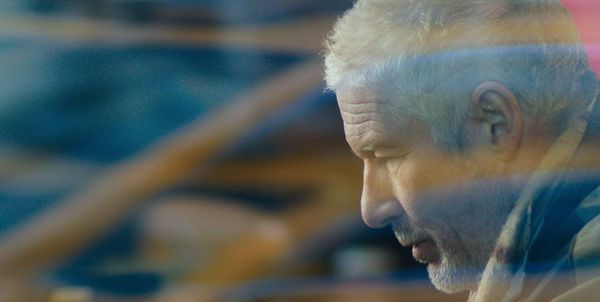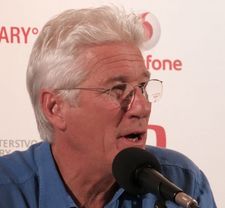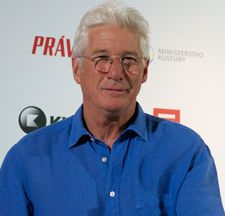 |
| Gere: 'I feel that the guy on the street is closer to the real me than the guy in the tuxedo. I have never been a billionaire but I have been homeless' |
A perspiring Richard Gere vowed today that he had no idea the Czech Republic was going to be so hot. He claimed it was was “like the Equator or Ecuador”. Sipping from a cup of green tea along with some mineral water, his range of topics at a media encounter ran from his stage appearance in the controversial gay play Bent, keeping his life and work in balance and cinema for senior audiences, to working with director Terrence Malick and his friendship with the Dalai Lama.
Gere has espoused Buddhism since his early 20s and says his faith is vital in his life. Although he has kept company with some of the most glamorous women in Hollywood including former supermodel Cindy Crawford, he is here with his Spanish girlfriend Alejandra Silva while he and his most recent ex, Carey Lowell - a former Bond girl and mother of his teenage son - pursue divorce proceedings. As the special opening weekend guest of the 50th anniversary edition of the Karlovy Vary International Film Festival, Gere will introduce an open-air screening later today (July 4) of Pretty Woman.
 |
| Richard Gere: "It is rare to find four movies back to back that I would want to do and that they wanted me to do.” (Photo Richard Mowe) Photo: Richard Mowe |
RG: I live in New York and so two of the films [Time Out Of Mind and Franny] were made there or Philadelphia [Gere’s birthplace], which is very close. I usually insist on having my weekends off to be with my son. I shot The Second Best Exotic Marigold Hotel in India but that was short - only a couple of weeks. it is not too hard but you have to pick and choose and I choose to be with him - so I make choices to work close to home or otherwise not at all. It is rare to find four movies back to back that I would want to do and that they wanted me to do. I don’t think I have ever done that before.
Q: With your role in The Second Exotic Best Marigold Hotel still fresh in our minds, do you think Hollywood and the rest of the film community have woken up to the niche audience of senior citizens who also want go to the cinema?
RG: Certainly the realities are that for films made for older moviegoers who do not want to go to the high tech and high action movies, the parameters are well prescribed: you have to have a small budget and you have to have a real story in the traditional sense of a narrative, and you have to have people who are recognisable like we did in Marigold. They were all actors with a reputation and senior citizens would recognise them as people they would want to see. You cannot buy an audience like that. You can with a high tech movie, which you make so zappy and spend a fortune on publicity and in a couple of weeks you make back your production costs. It is a whole different thing than making a drama - and if you describe your project as a drama you will never get financing. You have to find another way of talking about it, which has been a huge change since I started out. When I began, what are now independent movies were made by studios. All of my films at that time were made by studios but they were all low budget and independent films. The people in the studios wanted to make adventurous small movies and took pride in them. That is now the independent world.
Q: It is 30 years since you appeared in the Broadway production of Martin Sherman’s Bent for which there is a new production now planned in Los Angeles. When you played that role - which was very controversial then and also timely now in the light of the gay marriage vote in the States - what advice were you given before taking the role?
RG: People are always bringing up the fact that they consider it was daring to do the production. For me, it wasn’t. It was a brilliant play by Martin Sherman. I liked Martin and I liked the director [Robert Allan Ackerman] and it seemed like an important piece about the human yearning for love and how irrelevant it is if you are a man or a woman or an insect or a dog or whatever. We are all leaning towards love and connections. That was the only thing I saw in it. Because it was two gay characters, I did not think it was dangerous for me. I never thought of my work as a career or as planning a career. The main reason was that it was a brilliant play on stage and the theatre was my background and it gave me the opportunity to go back there. I lived at home in New York and was able to do this wonderful play on Broadway with people I wanted to work with. Beyond that, I have never made choices with the idea of my career in mind. When Martin wrote it, it was just in the beginning of the HIV and AIDS crisis so it resonates with that, and now with the gay marriage vote in the States it is also relevant. As gay marriage was legalised here [the Czech Republic] in 2006, clearly you are much more progressive country.
Q: What does your Crystal Globe accolade mean to you?
RG: The Czech Republic has interesting culture. Lying between these two big cultures - the Germans and the Russians. The dynamics over centuries have enriched who you are as a population especially in terms of culture. The Festival is really about the art of cinema rather than the song and dance that goes around it. So to be celebrated here in this place and at this Festival is a great honour.
Q: Was your role in Days Of Heaven an important stepping stone?
 |
| Richard Gere: "I would be welcomed by the Chinese people but not the Government." Photo: Richard Mowe |
Q: Why did you do that recent Japanese commercial for Orangina?
RG: I do those commercials because that is how I fund my Foundation [the Gere Foundation awards grants to groups that are dedicated to the cultural preservation of Tibet and the Tibetan people; and is dedicated to providing HIV/AIDS care, research and treatment and to those organisations addressing human rights violations throughout the world]. All that money goes to my Foundation and I find benign things to promote. I don’t help to sell anything that is going to hurt anyone. They have been very generous to my Foundation and my son likes the product.
Q: Is there something and special unique about working with an Israeli director like Oren Moverman?
RG: Maybe they are a little more complex because they are Israelis. I tend to be drawn to these rich countries, which through history have been drawn to some kind of historical and political jeopardy. It enriches the texture of their culture. It makes the thinking deeper and emotions deeper. And you do not have the luxury of relaxing. There is a certain tension there which is good for drama and what we do - for novelists, musicians and filmmakers. I was aware of Oren because someone sent me one of his scripts that he had co-written a long time ago. Then he co-wrote the movie that Toddy Haynes made on Bob Dylan - I’m Not There. Oren and I became friends then and when I bought the script of what is now Time Out Of Mind, we decided to work together.
Q: You shot Time Out Of Mind [the opening film in the Festival and set among New York’s homeless community) in a very short time - how challenging was that?
RG: There is a non-profit group in New York, the Coalition for the Homeless, and I have been working with them for ten years. I have been in those shelters for a long time. The Coalition is one of two groups - there is also the Legal Aid Society. I had to have a special pass to get in as an inspector of behalf of the Coalition. As I spent more time with them, I began to understand the rhythms the sounds and the flavours of being in a place like that. I feel a responsibility to tell it as naturally and realistically as possible. The whole idea of the film was that we would be out on the streets and not normally places I would walk around. I still get a lot of attention when I am on the streets for reasons that I cannot explain. We set up cameras in a Starbucks. I was totally in character and standing on a street corner and no-one was paying any attention. I started asking for change, and we shot 45 minutes and no-one paid any attention. Some people put money in my cup but did not make eye contact, so I was unsuccessful as a bum. I feel that the guy on the street is closer to the real me than the guy in the tuxedo. I have never been a billionaire but I have been homeless. My character is not moving in the rhythms of the world around.
Q: Your friendship with the Dalai Lama means that you are banned from China. What will happen?
RG: I would be welcomed by the Chinese people but not the Government. The Czech people welcomed the Dalai Lama to this country when many other political leaders had not done so for fear of upsetting China, which controls Tibet. The solution is that there would have to be a Prague Spring in Tibet.





















